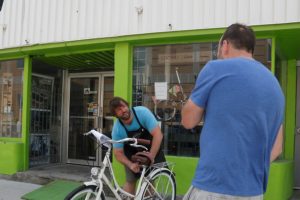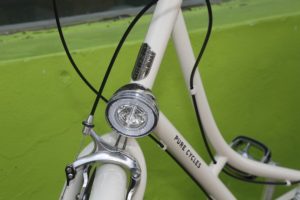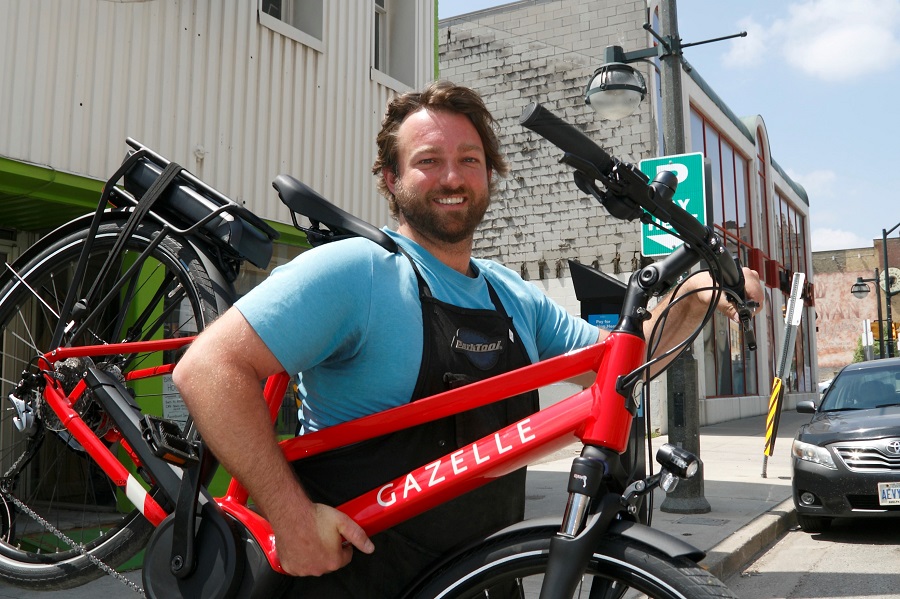Cranking Up, Gearing Down
Busier than ever but frustrated by a lack of urban cycling lanes, a bike shop owner mulls over his future path
Photo: London Bicycle Café owner, Ben Cowie
WHEN BEN COWIE opened London Bicycle Café three years ago, he envisioned a city where people could easily and safely use bicycles as their primary form of transportation. And this spring, as the weather warmed up and the pandemic dragged on, more and more people considered that very option.
“Every day, we hear from someone who says, ‘I don’t want to be on a bus right now.’ More and more people are interested in transportation cycling.”
During the months that people isolated at home there were far fewer cars on the road, and Cowie benefited from an uptick in sales and rider interest. But he also predicts this will change as restrictions are lifted. The more vehicles on the road, the less safe cyclists feel, he says.

“We believed by now there would be protected lanes throughout downtown – that’s one of the reasons we chose to open our store here. London has an A-plus-plus recreational network, but not a good transportation network.”
Normally, Cowie works alone in his Clarence Street store from December through to March, then calls in two bike mechanics when business picks up in the spring. This year, in order to reach isolating clientele, he went mobile — stocking a cargo bike with tools and parts and bringing tune-up and basic repair services to people’s doorsteps. The service proved to be so popular he plans to continue offering it even after the in-store repair department is back at full speed. “With the demand, we could double our capacity if we could hire another person,” he says. “We require our bike mechanics to have professional certification and training.”
“We believed by now there would be protected lanes throughout downtown – that’s one of the reasons we chose to open our store here” —Ben Cowie
Temporarily closing the store in mid-March, Cowie turned to his online shop for sales of bikes, parts and accessories, and instituted a free delivery service for orders within five kilometres of the shop. He also engaged his clients in online discussions, and scheduled roadside appointments for those interested in test riding a few different bikes. “We’re doing more concierge-style work than we ever have before, and I think people are really enjoying the experience,” says Cowie. “We doubled our sales of cargo bikes this year.”
With sales humming along (on May 25, for example, Cowie sold 10 bikes – “which, for a small store like ours, is an absolutely preposterous number,” he posted to Twitter), things were looking good. But by early June, he was facing a challenge increasingly common to bike retailers around the globe: bikes were flying out the door, but few were entering.
Just like toilet paper, yeast and flour before them, bikes were becoming scarce. When pandemic measures shuttered bike manufacturers in Asia, the supply chain skidded to a halt, or at least slowed significantly. “We still have a good selection of bikes,” Cowie says, “but certain sizes and colours are starting to dwindle, with no restocking date in sight for most brands.”
As the province moved into phase two of reopening, Cowie maintained an appointment-only policy for in-store shopping and bike servicing — something he plans to do for the remainder of the calendar year. The small café part of the business also remains closed, though he is selling coffee beans and brewing accessories online as well. “We’re doing our best to connect virtually, and we’re lucky our customers have been so good about coming down to see us,” he says.

Looking down the road, Cowie will continue to be a vocal advocate for protected bike lanes and a larger urban transportation network for cyclists. “Other cities like Montreal, Toronto and K-W have used this [pandemic] time to add hundreds of kilometres of bike lanes,” he points out.
Frustrated by a lack of commitment to develop an urban network of bike lanes, Cowie is uncertain he will remain in his current location. “The city had committed to downtown bike lanes, but between the time we signed the lease and opened the store they cancelled those plans. Unless there is a major sea change, we will be out of here by April 2021,” he says. ![]() Kym Wolfe
Kym Wolfe


